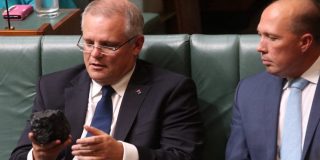It seems that scientific literacy has little to do with attitudes to climate change. Given all the major scientific academies, most esteemed science journals, and major scientific bodies affirm the high probability that human actions are changing the climate, one might expect that the more scientifically literate a person is the more likely they will be to accept the scientific consensus.
This apparently is not the case. An American study found that scientific literacy had little bearing on people’s attitudes to climate change. The study tested people’s concern with climate change and found that those with high levels of scientific literacy were just as likely to have little concern about the risk of climate change as those with little scientific literacy. Their study showed that far more significant than scientific knowledge were cultural commitments.
[P]eople who subscribe to a hierarchical, individualistic world-view—one that ties authority to conspicuous social rankings and eschews collective interference with the decisions of individuals possessing such authority—tend to be sceptical of environmental risks. Such people intuitively perceive that widespread acceptance of such risks would license restrictions on commerce and industry, forms of behaviour that hierarchical individualists value. In contrast, people who hold an egalitarian, communitarian world-view—one favouring less regimented forms of social organization and greater collective attention to individual needs—tend to be morally suspicious of commerce and industry, to which they attribute social inequity. They therefore find it congenial to believe those forms of behaviour are dangerous and worthy of restriction.
In other words we tend to shape our beliefs to fit with our world-view rather than the other way around. The study authors suggest that we shape our beliefs around climate change in terms of the risk we perceive to our acceptance by peers with whom we share a common world view.
This gives me pause for thought. The science is overwhelming – it is almost certain that human actions are driving climate change. Yet scepticism is high. Assuming the study findings translate to the Australian context, we need to do more than increase understanding of climate science. We need to address the cultural underpinnings of climate scepticism, to show why it makes sense for those with a hierarchical, individualistic world view to act and to make it acceptable for those with such a worldview to embrace concern about climate change. Perhaps central to this is for business, political and conservative religious leaders who are committed to action on climate change speaking out.




